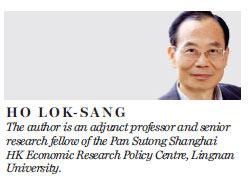Making life better for HK's workers
Updated: 2016-01-19 08:49
By Ho Lok-Sang(HK Edition)
|
|||||||
Ho Lok-sang offers some practical and sensible suggestions to address the problems of standard working hours, the MPF offset mechanism and universal pension issues
Many critics of the Policy Address are disappointed that it did not address three issues related to workers - standard working hours, the Mandatory Provident Fund (MPF) offset mechanism, and the universal pension issue. Here are my recommendations.
On the issue of standard working hours, I think we are all agreed that excessive working hours are bad for a person's health and their work-life balance. So there is indeed an imperative to prevent excessive working hours. This is why I have called for putting a ceiling on working hours that must be observed, meaning that employers should not even be allowed to pay workers more to work excessively long hours.
Understandably, sometimes over a short period it may be necessary to work very long hours to meet a deadline; but in that case workers must be given more time off during the same month so that average working hours do not exceed the permissible threshold. Because the nature of work varies, with different jobs having requirements in terms of work intensity and stress, standardizing working hours across occupations is difficult. It just makes no sense to me that a nurse working in intensive care and a watchman working in a building should have equal standard working hours.
As to the MPF offset mechanism, both workers and employers have valid arguments - in one instance to abolish it and in the other to retain it. Workers will all retire one day, and if their MPF savings are paid out in advance to offset severance payments, they will lose their MPF protection when they retire. On the other hand, employers argue the offset mechanism was the lure which got them to agree to the MPF contributions in the first place. Many employers are also truly struggling to make ends meet in the present economic environment. I would argue that the SAR government should replenish the MPF savings that are offset by severance payments. Since only workers who have worked for a number of years and are laid off are entitled to severance payments, the total burden on the government for replenishing the MPF savings that are offset should be affordable.
And finally, the universal pension plan; I agree that having a universal pension plan that guarantees a basic pension is very important, but I also agree that a pay-as-you-go plan is subject to concerns that it may not be sustainable. To be sustainable it should be "fully funded", meaning that a mechanism for ensuring that funds for each cohort of pensioners must be secured in advance by design. Otherwise, the time may come when suddenly it is realized that the funds are not enough, so that taxes need to be raised or the pensionable age has to be advanced or the amount of pension benefit has to be reduced.
The risks of a pay-as-you-go plan are actually quite obvious. With the population aging and expectations rising, the dependency ratio will rise and pressures on the government to increase the pension stipend may also increase. The perception that the cost is borne by someone else and not me will translate into bigger pensions which will become unaffordable even in the absence of rapid aging. It is easy to say that we can tax the corporations, as if corporations are always the cash cows that will deliver. But higher profit tax rates may lead to less investment and fewer jobs.
We can, however, have a universal pension plan using the cohort-based, fully funded pension that I have proposed in this column before. All Hong Kong people born in the same year belong to the same cohort and need to contribute an equal amount. They are entitled to draw the same stipend from the pool of money formed by the contributions. Those who satisfy a means test will be entitled to a partial or full subsidy to help with their contributions. Since the stipends can only be paid from this pool of money, any increase in the stipend will have to be paid by bigger contributions.
This cohort-based plan does imply that older workers will have fewer years to contribute, and thus the pool of money formed by contributions may not be big enough for a large stipend. However, most of these workers do have MPF savings and personal savings. It is possible for them to "buy in" equivalent years of contributions so they will be entitled to a bigger stipend. Suppose the standard stipend is HK$3,500 a month and 40 is the standard years of contribution. If the equivalent years of contributions are 20, the stipend would be one-half of HK$3,500 dollars.
The main advantage of subsidizing contributions rather than targeting the poor for a "pension" is that the problem of moral hazard can be minimized: That is, we can avoid inducing people to deplete their savings or not to save at all in order to qualify for the pension. Another advantage is this ensures the "fully funded" nature of the plan. Money is set aside ahead of needs.

(HK Edition 01/19/2016 page9)